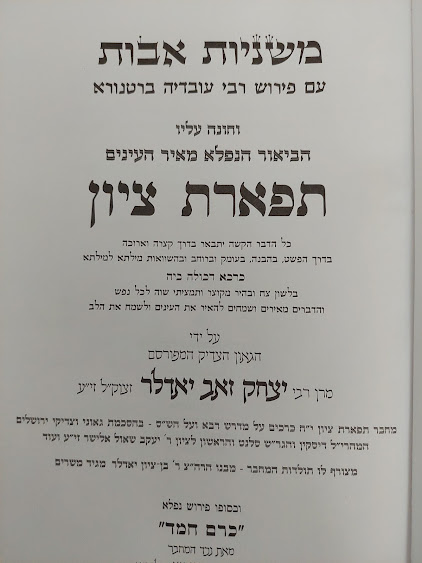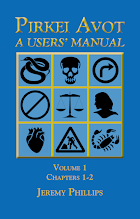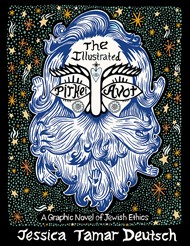Many people enhance their enjoyment of Pesach by purchasing
a brand-new Haggadah each year, offering fresh insights into the age-old story
of our redemption. But this pleasure is a fleeting one. Once Pesach is over and
its novel pleasures have been fully exploited, the new Haggadah—like the
unsuccessful candidates for the heart of Achashverosh—is consigned to the harem
of a dusty shelf where it joins its predecessors and awaits the recall that so
infrequently comes.
Pirkei Avot is different. Most people do not buy a fresh
commentary each year. Nor, in many cases, do they make much use of such
commentaries as they may have, preferring to rely on the version printed in
their regular siddurim which they may recite, with varying degrees of interest
and attention, at the end of the afternoon prayer service on Shabbat.
Some recent titles
For those who do propose to buy a new Pirkei Avot commentary
this year, here are a few recent options you may wish to consider:
Alshich on Avos: Timeless Wisdom on Pirkei Avos, translated
by Rabbis Avie Gold and Nahum Spirn and distributed by Feldheim. This is a reprint
of the original 2014 version, which has been unavailable for a while. The
Alshich did not actually write a commentary on Avot, but a compilation of his
thoughts on the tractate was assembled under the title Yarim Moshe by R’
Yirmeyahu Schlanker back in 1764. Anyone who has tried learning Yarim Moshe
will know that it is tough work. In particular, where it follows the once
popular style of commencing a commentary with a list of questions that the
author proceeds to answer, in the Yarim Moshe the number of answers often
differs from that of the questions and it is often unclear which of the answers
relates to which question. This lucid and
helpful translation does not translate Yarim Moshe in its entirety but
selects mishnayot of particular interest and focuses on them.
Etermal Ethics from Sinai by Rabbi Yaakov Hillel,
published by Ahavat Shalom, is not for the faint-hearted. Volume 1, covering
the first perek in considerable depth, came out in 2021 and it has now been
joined by a companion volume on perek 2. This is nearly 700 pages of
cask-strength mussar, focusing on human foibles and frailties before
offering some plain advice, drawn straight from impeccable sources, on how to
correct them and amend one’s ways. R’ Hillel’s motives are pure—to raise our
game and perfect our precious souls—but these desirable outcomes can only be
achieved if the reader is prepared to put in the requisite effort.
Living Beautifully, by Gila Ross, published by
Mosaica. I recently noted this book on Avot Today and I’m more than halfway
through it. Unlike the lofty peaks addressed by R’ Hillel, Mrs Ross’s territory
is closer to the foothills of Torah middot, gently nudging the busy and probably
female reader to take at least the first few steps towards living a life that
is not only objectively better but which feels good at the same time. Incidentally, while both this book and R’
Yisroel Miller’s The Wisdom of Avos are
published by the same publisher, their English translations of the mishnayot are
a bit different: that of Mrs Ross is a little gentler.
A couple more books on Avot have emerged over the past year
or two, which I have yet to lay my hands on. They are:
The Eternal Wisdom of Pirkei Avos, by R’ Yechiel
Spero and published in 2023 by ArtScroll. According to the publisher’s blurb: “…In
The Eternal Wisdom of Pirkei Avos master teacher and storyteller Rabbi
Yechiel Spero shares with us an insight, a story, and a takeaway for every
mishnah in Pirkei Avos. By combining the brilliant understanding of the Tannaim
with stories as contemporary as today, Rabbi Spero offers us a powerful way to
bring the messages of Pirkei Avos into our daily challenges and experiences,
enhancing our relationships and bringing new, joyful meaning to our lives”.
Foundation of Faith: A Tapestry of Insights and
Illuminations on Pirkei Avot Based on the Thought and Writings of Rabbi Norman
Lamm, by R’ Mark Dratch, published by OU Press. According to the blurb this
work is “an outstanding compilation of selections from Rabbi Lamm’s oeuvre, all
related to the ethical, philosophical, and theological themes of Pirkei Avot.
Inspiring and profound, the commentary is a scintillating demonstration of
Rabbi Lamm’s invaluable message for contemporary Jewry. … It is in Torah that
God is most immediately immanent and accessible, and the study of Torah is
therefore not only a religious commandment per se, but the most exquisite and
the most characteristically Jewish form of religious experience and communion.
For the same reason, Torah is not only legislation, Halachah, but …teaching, a
term that includes the full spectrum of spiritual edification: theological and
ethical, mystical, and rhapsodic”.
A few oldies
If these new titles don’t appeal to you, it’s worth digging
around in the second-hand bookshops to see what you can find there. Here are
some old Pirkei Avot books that I have recently found in second-hand shops:
Ohel Binyamin, by R’ Binyamin Beinush Rabiner,
published by Moreshet in Tel Aviv in 1946—two years before the founding of the
State of Israel. The pages are brittle and discoloured with age, so I shall be
reading this volume with extra care. Can readers help me with information about
this author? All I know is that he was also the author of Ner Binyamin and
that he was rabbi of Schimberg in Courland, Latvia.
Mei Marom, by R’ Yaakov Moshe Charlap, published
posthumously in Jerusalem in 1975 by Midrash Gavo’ah LeTalmud Bet Zevul. R’
Yaakov’s shul is only a few minutes’ walk from my apartment and I understand
that he was quite a controversial figure—a man of uncompromising orthodoxy but
a close friend of R’ Avraham Yitzchak Kook and a staunch believer that the
foundation of the State of Israel was the beginning of the Redemption. This
book, which is said to be chelek sheni (“part two”) covers the first
three perakim of Avot in great depth, the final three in much less. But where is part one, I wonder, and what does
it cover?
When a Jew Seeks Wisdom: The Sayings of the Fathers, by
Seymour Rossel, published by Behrman House in 1975. This book may not be to
everyone’s taste since the majority of members of the Avot Today Facebook group
who are known to me are not members of North America’s Reform community. In reliance on Ben Zoma’s teaching at Avot 4:1
(“Who is wise? The person who learns from everyone”) I shall be taking a good
look at this title to see if it has anything to offer me. If it does, I shall
share it.
Coming soon
And now something for the future…
Ruchi Koval, author of Soul Construction, is
crowdfunding the publication by Mosaica Press of Soul Purpose—a daily
reader based on Pirkei Avot. She writes:
“Each day has a small, bite-sized
piece of wisdom, followed by a daily goal. To my mind, it is a very accessible
and practical (and sometimes personal) way to understand this ancient and
beautiful wisdom.”.
To support this project, which it is hoped will be out by the end of 2024, click here for details.
For comments and discussion of this post on Facebook click here.





















